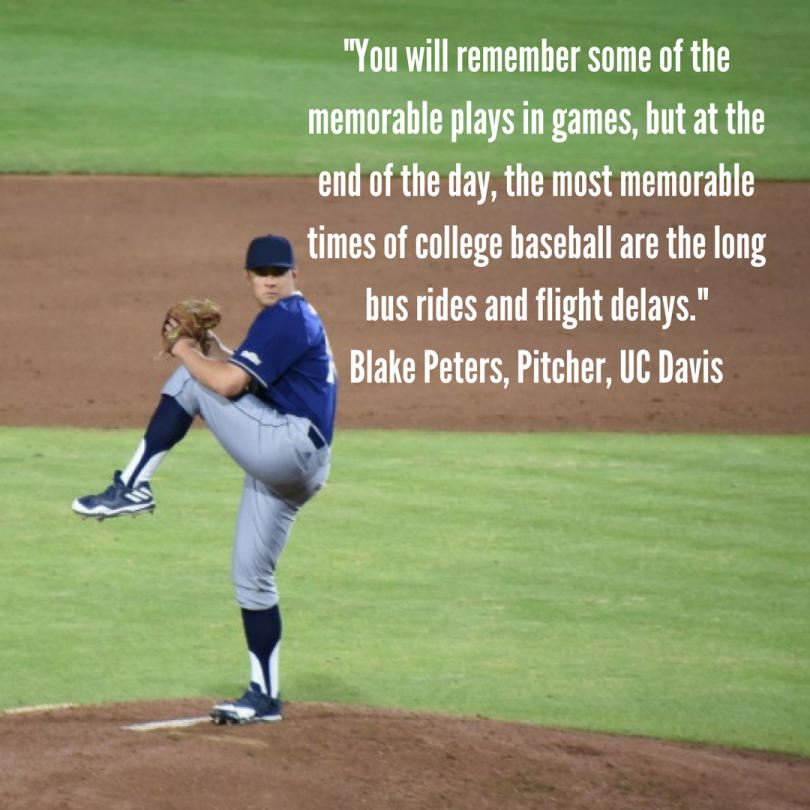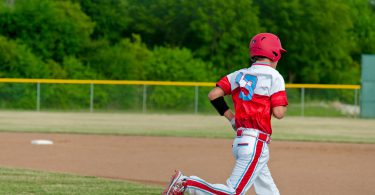The Players’ Tribune has a great series of articles called Letter To My Younger Self. In this feature series, professional players pen a letter to themselves at a younger age. They use their experience and hindsight to give advice and talk about things they could have done differently. We love the idea of learning from experience and the experiences of others. Current and former college players have a lot of valuable advice to offer current college baseball prospects. We thought that Letter to My High School Self was a great platform for successful players to share this advice. We hope you can learn from the lessons of those who made it to the next level!
Dear 16-year-old Blake,
You just finished your last game of your first varsity season and junior year. While to most, it is simply the end of another high school season, to you it is much more. Keep this passion.
You have been playing baseball since your earliest memory. Your family and you have committed to your passion for baseball through practices, games, and tournaments. Baseball has given you a chance to travel all throughout California, Cooperstown, New York and even as far as Toyonaka, Japan. You have worn through countless baseball pants, cleats, socks, hats, and bats. Your parents sacrificed a lot to allow for you to attend a private all-boys high school, knowing the advantages that are provided in the education and athletics. Be thankful. Thank your parents.
The end of your junior year is a lot more to you than just, “the last game of the season.” For you, the clock is ticking on where you may find an opportunity to continue playing baseball. First things first, make a list of schools that you can see yourself playing at. Set the list with some “reach” schools, “realistic,” and “safe” schools. When you are making this list, be sure to do your research on the schools rather than just writing down schools that you have heard of. Research the coaches and their backgrounds and what their goals are. Most importantly, find a school that if, for whatever reason baseball may not work out, you can see yourself attending that school for the time it is going to take to get your degree.
At the end of the day, the reality of playing professional baseball is very low, so make sure you are going to a school that is going to put yourself in the best position for life after baseball. Once you make this list, be open to other options and constantly be updating your list of schools based on how your needs change. Do not get down on yourself when coaches do not call or reach out to you right away. Be proactive.
The end of the high school season, for you, is going to mean trying out and making an elite and prestigious showcase baseball team. Again, your parents are going to sacrifice a lot in order to pay for this team and get you to games throughout California. Be thankful. Thank your parents. When you play for this organization, it is going to be unlike any team you’ve been on. You’re going to be playing with countless future draft picks, college standouts, and very hardworking players. You may think you do not belong on such a good team. But, it is the same game and you belong. Use the summer you play for this team to learn from those around you and make relationships. Slow everything down.
During your time on the showcase team, you are going to learn many lessons everything from how to carry yourself on and off the field, how to talk to college coaches, and ultimately how to give yourself the best opportunity to keep playing baseball at the college or professional level. The most important lesson you can learn is maturity. Maturity on and off the field. And, maturity on the field is how you carry yourself on the field, including how you wear your uniform, showing up on time, and dealing with failure. Maturity off of the field consists of being polite to those around you, holding yourself to a high standard when communicating with coaches or others, and most importantly taking care of your social media. You never know who is watching, and you don’t know who talks to who. Respect the game, those around you, and yourself.
After the last game of your summer showcase season, schools are going to start seeing your hard work, commitment, and performance. Three schools are going to call and bring you on campus for an unofficial visit to show you their campus, baseball program, and offer you a scholarship. Appreciate these opportunities, thank the coaches, and take in everything you are being shown. It is pretty special. Blake! Come to these visits prepared with questions! Show you are interested! Show that you have done your research on the school prior to visiting!
After the visit, there a number of things you should do. First, within the first couple days, send the coaches an email and thank them for their time and the opportunity to see their school and program. Second, take your time accepting or declining the offer. Talk to those around you, research it more, and make sure that you are making the right decision for you and your family because it is going to be your home for twenty four hours a day, seven days a week, for four years.
While this process of choosing a school and talking to different college coaches can be very stressful, cherish it. The opportunity to play college baseball has been your dream for as long as you can remember and now it is coming true. Before your senior season starts, your are going to commit to University of California, Davis, which is going to be the best decision you have ever made.
Your first year of college baseball is going to be overwhelming. To break down your week, you are going to have class from 8am until 12pm, practice from 12:30pm until 3:00pm, conditioning from 3:30pm until 4:00pm, weight lifting from 4:00pm until 5:00pm, and then study hall from 7:00pm until 10:00pm. It is a very long day mentally and physically. You will learn the importance of eating right, planning ahead, and time management.
Lastly, take care of your class work. The higher your grades in high school, the more opportunities you will get with schools. College coaches want to see that you are able to handle the struggles of excelling in the classroom and the field. They want to know that the guy they are recruiting is not going to be an issue in the classroom because if you are not eligible, then you are no help to the team. Class comes first.
Keep working hard,
Senior in college Blake
This article was first published in 2017.







